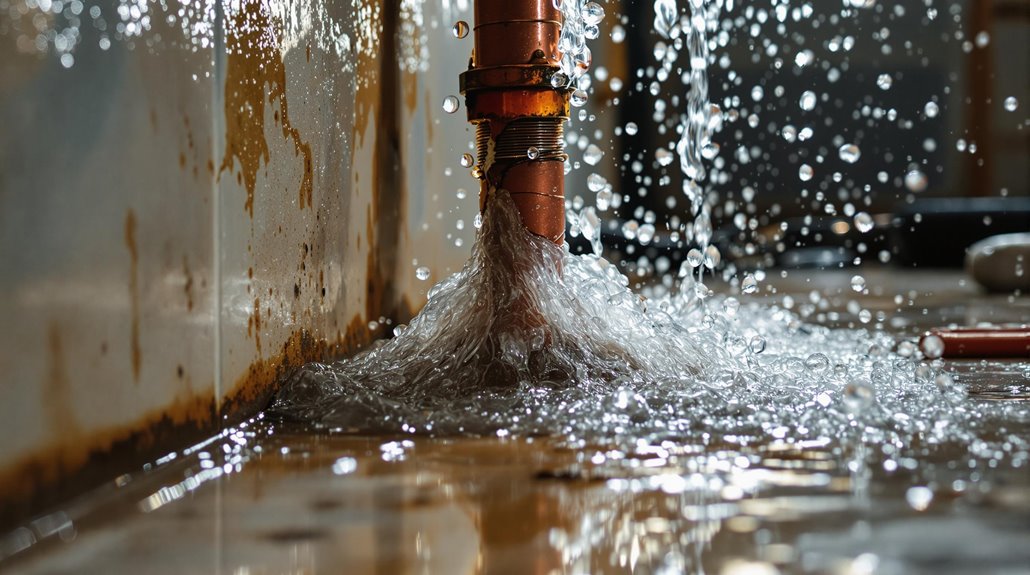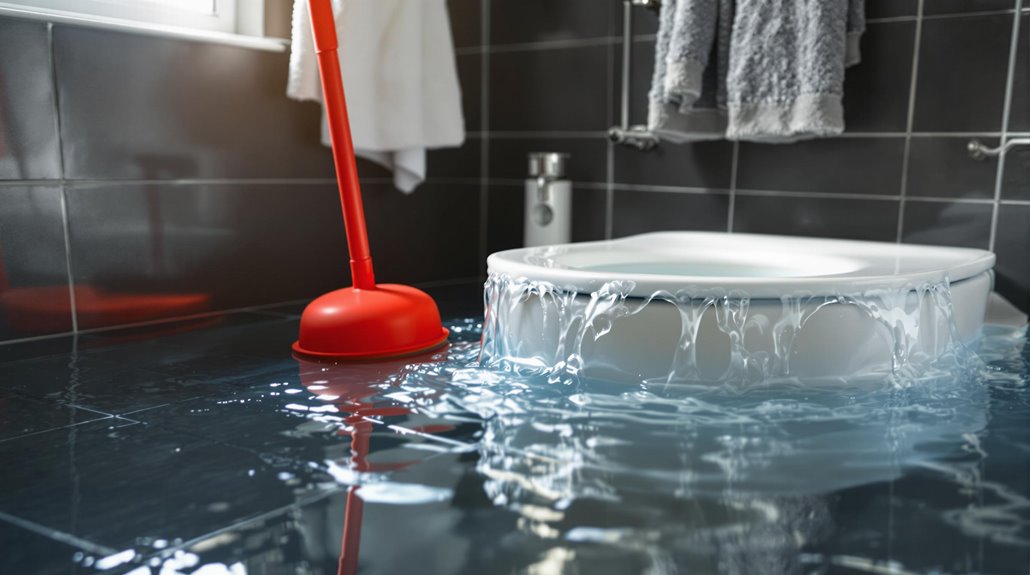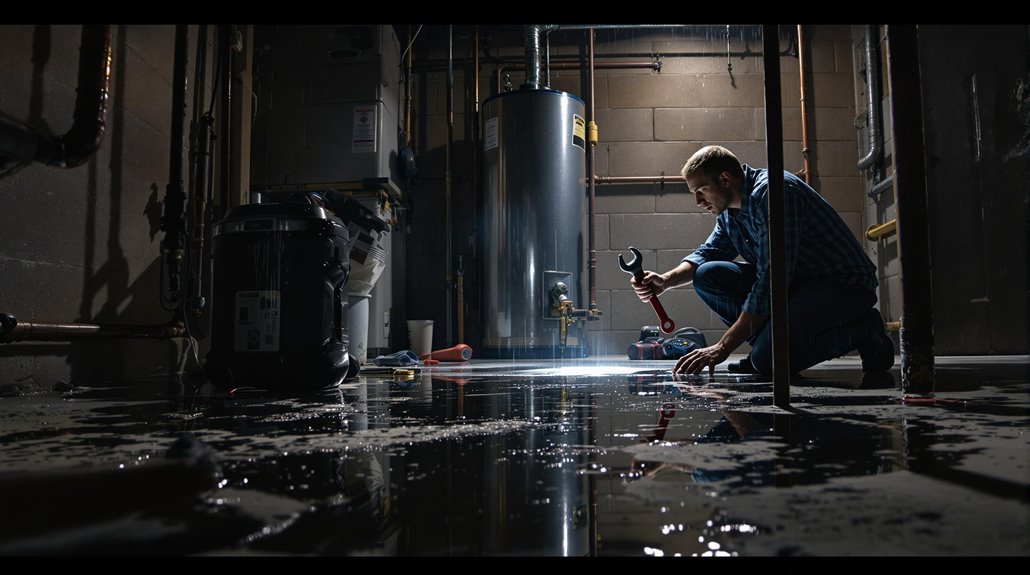When it comes to plumbing emergencies, burst pipes and overflowing toilets are at the top of the list. Burst pipes often occur during cold weather as a result of freezing water, while clogged drains can lead to unpleasant odors and backups. You may likewise face issues like leaky faucets that waste water or water heater failures disrupting your hot water supply. Regular maintenance and quick action can help prevent these problems from escalating. Being aware of these common emergencies allows you to stay prepared and minimize damage. Keep exploring to find out how to effectively address these plumbing issues.
Key Takeaways
- Burst pipes due to freezing temperatures can cause significant water damage and require immediate professional repair.
- Clogged drains lead to unpleasant odors and potential sewer backups, often needing regular cleaning or professional assistance for resolution.
- Overflowing toilets create unsanitary conditions and require prompt maintenance to prevent water damage and hygiene issues.
- Leaky faucets waste water and increase utility bills, typically resolved by replacing worn-out washers or seals.
- Water heater failures disrupt hot water access, often caused by sediment buildup, thermostat issues, or heating element failures.
Burst Pipes

When temperatures drop, you might find yourself facing one of the most common plumbing emergencies: burst pipes. This issue typically arises when water freezes within your pipes, causing pressure to build and ultimately leading to a rupture. To prevent this, you should invest in pipe insulation, especially in areas exposed to cold air. Proper insulation can greatly reduce the risk of freezing. If you find a burst pipe, your first step is to locate and activate the emergency shutoff valve to stop the water flow, minimizing damage. Once the water is off, you'll need to call a plumber to assess and repair the damage. Being proactive with insulation and knowing how to shut off your water can save you from costly repairs. Emergency plumbing services are available 24/7 to handle such situations effectively.
Clogged Drains
Clogged drains can quickly turn into a frustrating plumbing emergency. When water isn't draining properly, it can lead to unpleasant odors and potential sewer backups. Common causes include hair, grease, food particles, and foreign objects obstructing the pipes. To tackle this issue, regular drain cleaning is crucial. You can use a plunger or a plumber's snake to dislodge minor blockages. For persistent clogs, consider chemical drain cleaners or calling a professional plumber. Ignoring the problem can escalate to more significant issues, including severe backups that may require extensive repairs. Be proactive with maintenance to guarantee your drains function effectively and avoid the headache of plumbing emergencies. Remember, timely action can save you from costly repairs down the road. Additionally, seeking emergency plumbing services can help minimize water damage risks and ensure a swift resolution to your plumbing issues.
Overflowing Toilets

An overflowing toilet can quickly escalate into a serious plumbing emergency, causing water damage and creating unsanitary conditions. To prevent this, it's crucial to focus on regular toilet maintenance. Here are four key steps to manage potential overflow situations:
- Check the Flapper: Confirm it seals properly to prevent constant water flow.
- Monitor Tank Levels: Adjust the float to maintain appropriate water levels.
- Keep an Emergency Kit: Equip your home with a plunger, towels, and a wet/dry vacuum for quick response.
- Know the Main Shut-Off: Familiarize yourself with your home's shut-off valve to stop water flow immediately.
Leaky Faucets
Leaky faucets are a common annoyance in many households, often leading to wasted water and increased utility bills. When you notice a drip, it's crucial to address it promptly. A leaky faucet can waste gallons of water daily, impacting both your wallet and the environment. Most leaks stem from worn-out washers, O-rings, or seals, making faucet repairs relatively straightforward. By replacing these components, you not only stop the drip but also contribute to water conservation efforts. Regular maintenance checks can help you identify potential issues before they escalate. If you're not comfortable with DIY repairs, consider calling a plumber to guarantee the job is done correctly, preserving both your plumbing system and your peace of mind.
Water Heater Failures

If you're dealing with plumbing issues, a malfunctioning water heater can be one of the most disruptive problems you might face. Understanding the common causes can help you address them effectively:
- Sediment Buildup: Regular tank maintenance can prevent this issue.
- Thermostat Malfunction: A faulty thermostat may lead to inconsistent water temperatures.
- Leaks: Inspect for leaks, which can indicate a need for repair options.
- Heating Element Failure: This can stop the water from heating altogether.
Conclusion
To summarize, plumbing emergencies often strike at the most inconvenient times, like a burst pipe during a holiday gathering or a clogged drain right before guests arrive. By being aware of these common issues, you can act quickly and minimize damage. Regular maintenance can help prevent many of these situations, but when they do occur, having a reliable plumber on speed dial can save the day. After all, a little preparation can turn chaos into calm.
